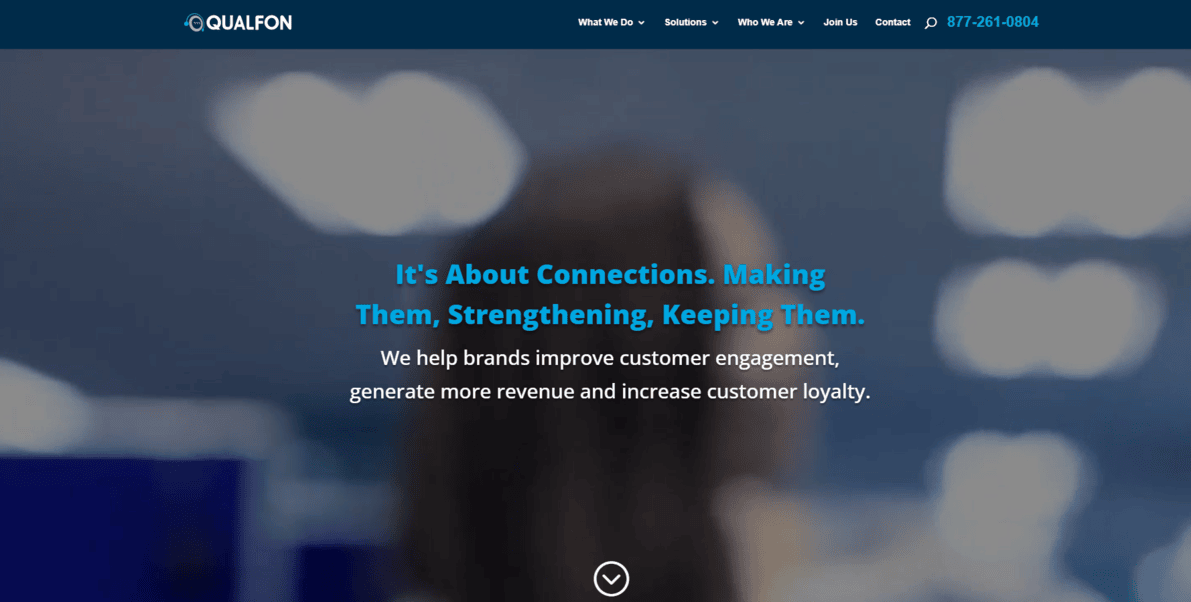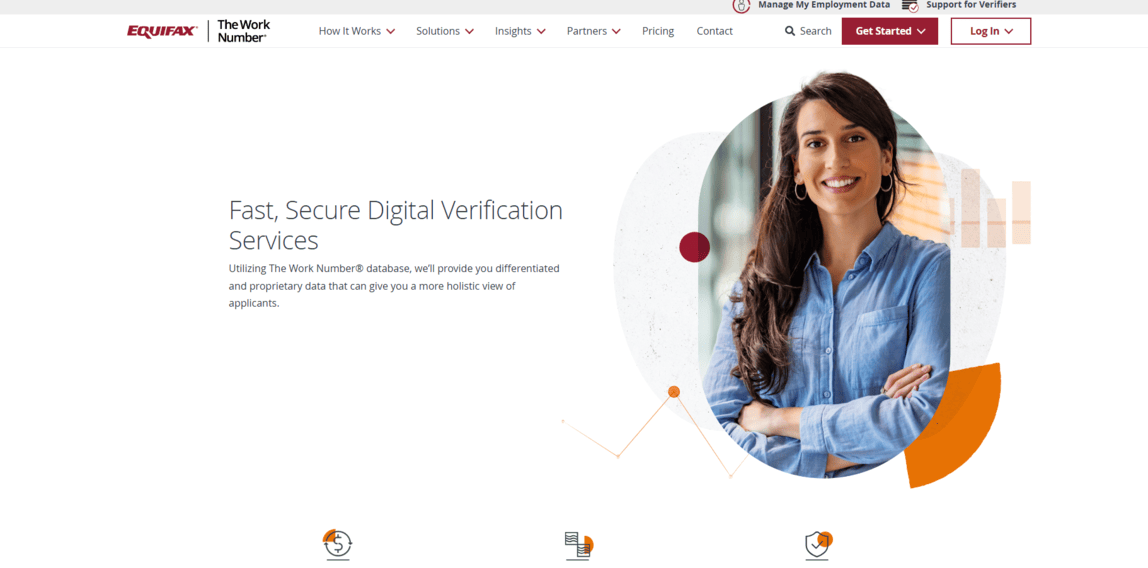How to Complete a LexisNexis Opt Out Guide [+ Examples]
Julianne Subia
Reading time: 8 minutes
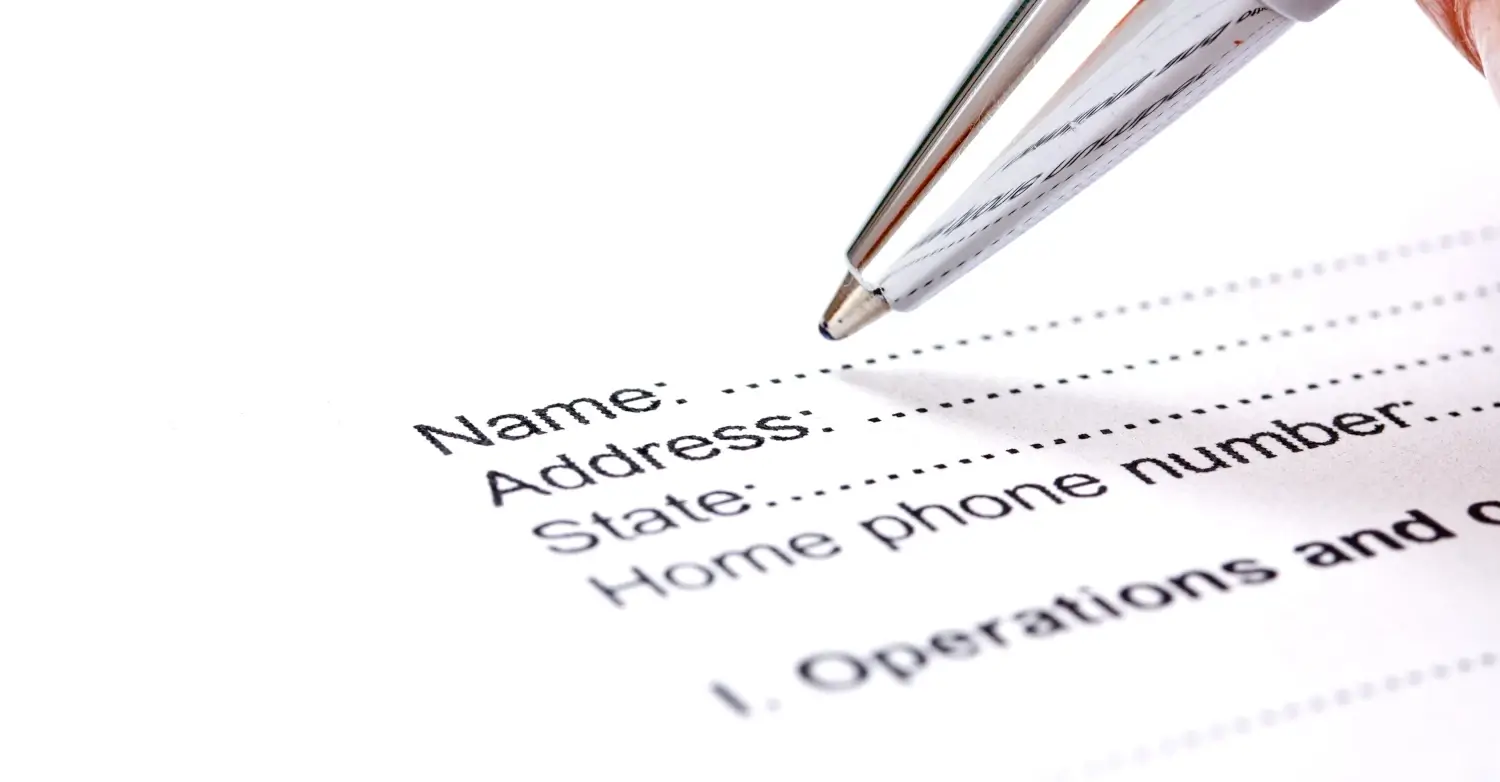
LexisNexis is a data broker platform.
It collects and sells personal data to businesses and other organizations.
Much of that data isn’t something you’d want passed around. The information LexisNexis collects includes not only your phone number and address, but also your family details and your salary.
Yes, it’s legal to collect and sell this data.
Yet, what happens if that data falls into the wrong hands?
Once a data broker like LexisNexis sells your info, they no longer have control over it, which means you don’t either.
Plus, it can end up in the hands of spammers, scammers, and robocallers, so if you want to protect your data, you need to keep an eye on sites like LexisNexis.
That’s why we’ve put together our LexisNexis opt out guide. It’s designed to help you remove your personal data from LexisNexis quickly and easily.
Here’s what we cover:
If you want to skip all the legwork associated with trying to track down your information on data broker sites like LexisNexis, let DeleteMe do the job for you. Our data removal services simplify opt outs and ensure you’re safe online.
What is LexisNexis?
LexisNexis is a global data broker. As such, they gather, analyze, and store data in vast databases. The data comes from online public and legal records, making their databases some of the largest. This information is then sold to third parties, such as government agencies.
Here are just a few examples of the kind of data LexisNexis gathers:
- Names
- Phone Numbers
- Emails
- Addresses
- Vehicle Registration
- Real Estate Transaction Records
- Bankruptcy Records
- Salary Details
- Personal Family Details
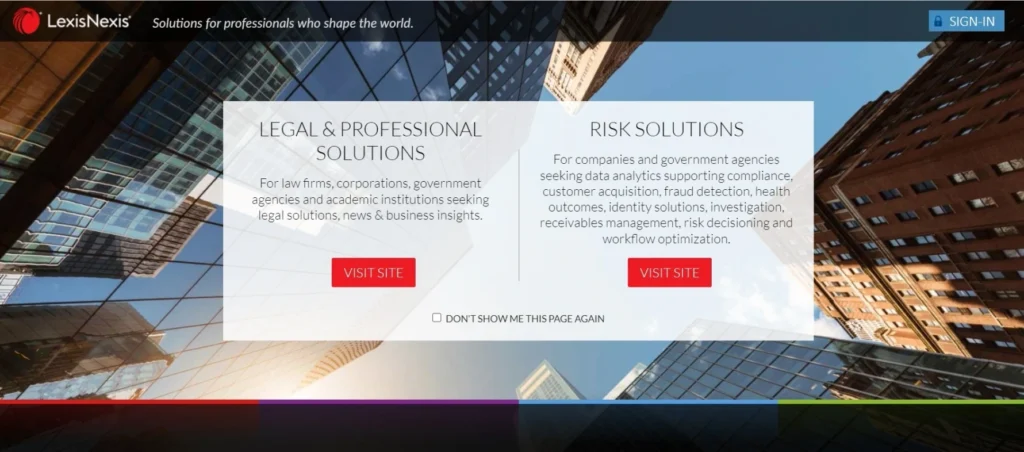
The important thing to note is that there is a difference between LexisNexis and LexisNexis Risk Solutions. That arm of LexisNexis sells data to clients beyond government and law enforcement. Examples include insurance, healthcare, and financial services clients.
So, if you’re worried about whether or not a LexisNexis opt out is a good idea, think about that. Do you want someone selling your personal information to companies like Progressive or MasterCard? Probably not.
The good news?
You can remove your data from LexisNexis.
The bad news?
It’s not super easy.
It’s also important to note that a LexisNexis opt out requires:
- Documentation proving your personal data can put you at risk of physical harm.
- Documentation proving that you are a victim of identity theft.
If you don’t have such documentation, you may not be able to opt out.
Pro Tip: Do keep in mind that even after you fill out the LexisNexis opt out form, it will take up to 30 business days to process your request and remove your data from the databases.
If you found your information on LexisNexis, you’re probably also listed on WhitePages. Need a WhitePages opt out guide? We’ve got you covered: Whitepages Opt Out Guide
How to Fill Out a LexisNexis Opt Out in Two Steps
Let’s start with the proof you need to provide regarding physical risk or identity theft.
Step 1 – Gathering the Necessary Documentation
As mentioned, you’ll need documentation to complete the LexisNexis opt out process. Here are the different types of documentation that you could provide.
Are you in law enforcement or a public official? You’ll need:
- A letter from your supervisor stating that your position exposes you to a threat of death or serious physical harm.
Don’t work in law enforcement but still at risk? You’ll need:
- A copy of a court protective order, police report, or similar document. For example, a letter from a shelter administrator or healthcare provider works.
Are you a victim of identity theft? You’ll need:
- A copy of the police report documenting the theft, an Identity Theft Affidavit, or a letter from your credit card company verifying the theft claim.
Once you’ve gathered your documentation, it’s time to fill out the online form.
Step 2 – Filling Out the LexisNexis Opt Out Form Online
Go to the LexisNexis Opt Out form online. You’ll see this screen:

- Click “Next.”
- Click “Next” again.
- Select your reason for opting out as shown in the image below, then click “Next.” (Note that the exact process and documentation required will vary slightly depending on your opt-out reason)
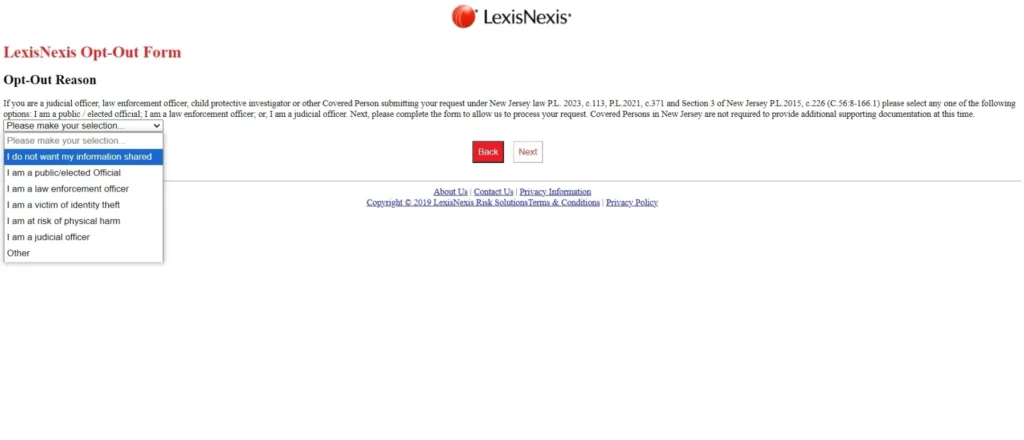
- Provide your first and last name. You DO NOT need to enter your social security number to proceed to the next step. Click “Next” if you only want to opt out for yourself. If you have family members who also live at your address who you would like to opt out, click “Add Person” instead and continue to enter as many names as necessary. Once you’re ready, hit “Next.”
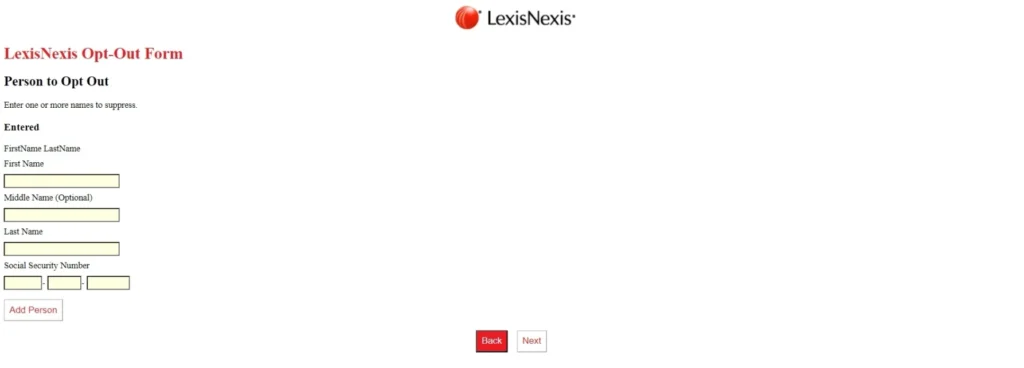
- Enter your home address. Again, you can enter multiple addresses if necessary for previous homes or for relatives. Once you’ve finished, hit “Next.”
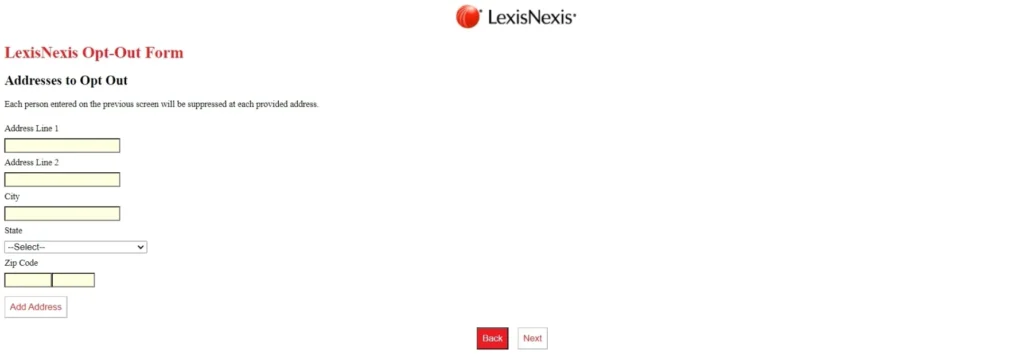
- On the next screen, enter either a phone number or an email address to receive notification of your LexisNexis opt out status. You can either choose an address for postal mail or opt out. We suggest only choosing one form of communication, such as an email address. We also suggest using a masked email address.
- When you’re done, hit “Confirm.”
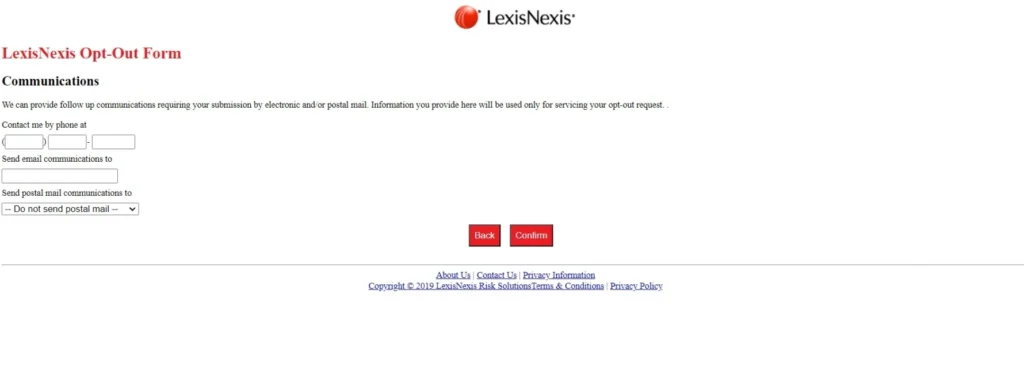
- For requests requiring documentation, you can attach files or alternatively mail any supporting documents to:
LexisNexis Legal & Professional Privacy Team
1801 Varsity Drive
Raleigh, NC 27606
- Otherwise, you should see a confirmation like the one below. You will also receive a follow-up message or email to confirm your choice to opt out of LexisNexis.
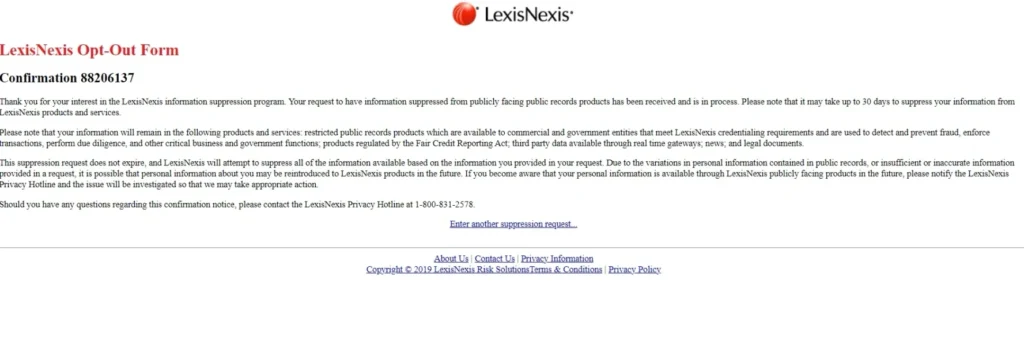
If all that seems complicated, you’re not alone. Many people have turned to DeleteMe to perform complex opt outs like this one in their stead. You can remove yourself from all of the largest data broker sites with the help of DeleteMe.
What Happens After You Opt Out of Lexis Nexis?
After you’ve completed the LexisNexis opt out process, they will suppress your personal information. This means LexisNexis database users won’t be able to find your records when performing searches on the platform.
If you’ve suffered from identity theft, or even cyberstalking, removing your records from LexisNexis will help lower the possibility of criminals and predators accessing your personal information.
Key Takeaways
While the LexisNexis opt out process isn’t fast or easy, it’s a good idea to remove your personal data from this data broker site. And that’s especially true for anyone suffering from identity theft, cyberstalking, or the risk of physical harm.
Start by gathering the necessary documentation and then fill out the form. Remember, data broker sites take your data from public records online. So, check back periodically to make sure your data hasn’t resurfaced.
At the end of the day, your personal data is yours to protect. See our FAQ below for answers to more questions you may have about the LexisNexis opt out process.
LexisNexis Opt out FAQ
1. Is it a good idea to opt out of LexisNexis?
The short answer is yes. The real question is whether or not it’s worth it to you to go through the trouble. That answer will depend a lot on your circumstances. You are more likely to succeed at a LexisNexis opt out If you are:
- In an at-risk profession like politics or law enforcement.
- Ideologically or politically active or vocal on social media.
- At risk of stalking.
- A victim of identity theft.
It’s important to note that other data brokers like National Public Data have suffered major breaches, exposing your personal data further. Whenever possible, you should opt out and consider data removal services to protect your information on an ongoing basis.
2. Can I remove my data from LexisNexis?
LexisNexis may not allow you to opt out unless you can show documentation to demonstrate that “information suppression” is necessary. It’s also possible that once LexisNexis removes your information, they may relist it at a later date, requiring another opt out. That’s why regular data removal should be a top priority.
3. Can I block LexisNexis?
You may be wondering if there’s a way to prevent LexisNexis from collecting your info in the first place. The answer is no. However, proactively searching for and removing your information goes a long way towards protecting your online presence.
4. Does LexisNexis affect my credit score?
LexisNexis has its own criteria for scoring. So, while it may impact how businesses view you, their data is not part of your official credit score. Plus, its searches are known as “soft searches,” which don’t impact your official credit reports.
Our privacy advisors:
- Continuously find and remove your sensitive data online
- Stop companies from selling your data – all year long
- Have removed 35M+ records
of personal data from the web
Save 10% on any individual and
family privacy plan
with code: BLOG10
news?
Don’t have the time?
DeleteMe is our premium privacy service that removes you from more than 750 data brokers like Whitepages, Spokeo, BeenVerified, plus many more.
Save 10% on DeleteMe when you use the code BLOG10.


